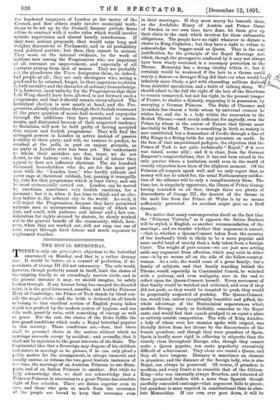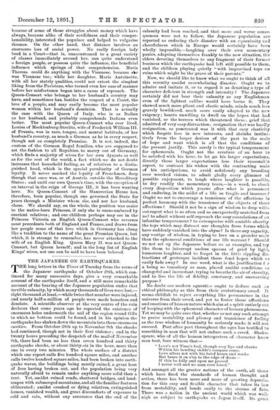THE ROYAL BETROTHAL. T HERE is only one prilmi-facie objection to
the betrothal announced on Monday, and that is a rather dreamy one. It would be better, as a counsel of perfection, if de- scendants of George III, did not intermarry. The rule would, however, though perfectly sound in itself, limit the choice of the reigning family to an exceedingly narrow circle, and in the present instance it may, we should imagine, be safely broken through. If any human being has escaped the dreaded taint, it is the good-humoured, sensible, and healthy Princess Mary of Cambridge; the Prince of Teck stands by blood out- side the magic circle; and the bride is declared on all hands to belong to that excellent section of English young ladies which has profited by the modern system of hygiene, and can ride, walk, possibly swim, with something of energy as well as grace. For the rest, the choice of the Duke fulfils the two grand conditions which make a Royal betrothal popular in this country. Those conditions are,—first, that there shall be personal choice in the matter, without which no marriage succeeds except by accident ; and secondly, that it shall not be injurious to the great interests of the State. The Continental idea that a Sovereign may dispose of his children and sisters in marriage as he pleases, if he can only plead a public motive for the arrangement, is always immoral, and usually unwise, as witness the two great historic instances of our time, the marriage of an Austrian Princess to one Bona- parte, and of an Italian Princess to another. But while we fully acknowledge that, we shall not acknowledge that a Prince or Princess in succession to a great Throne has absolute right of free selection. There are duties superior even to love, and those who gain so much from the reverence of the people are bound to keep that reverence even in their marriages. If they must marry far beneath them, as the Archduke Henry of Austria and Prince Oscar of Sweden in our own time have done, let them give up their claim to the rank which involves for them unbearable obligations. The people have no right whatever to dictate a choice to King Cophetua ; but they have a right to refuse to acknowledge the beggar-maid as Queen. That is the real justification for the principle of the Royal Marriage Act, which, though the prerogative conferred by it may not always have been wisely exercised, is a necessary protection to the Throne. Monarchy has a strong vitality within it; but it certainly would be weakened if the heir to a throne could marry a dancer—a dowager-King did that—or what would be i. infinitely more likely, a girl with abounding millions derive from doubtful speculation, and a habit of talking slang. W should admit to the full the right of the heir of the Bourbons to remain unmarried, but not his right, in the present temper of France, to shatter a dynasty, supposing it in possession, by marrying a German Princess. The Duke of Clarence and Avondale has chosen a bride whom by universal rumour he wishes for, and she is a lady within the succession to the British Throne,—rank surely sufficient for anybody, even the Prince by whom in the coarse of Nature that throne must inevitably be filled. There is something in birth as society is now constituted, but a descendant of Cerdic through a line of fifty Kings is a fitting bride for any potentate on earth. In the face of that unquestioned pedigree, the objection that the Prince of Teck is not quite technically "Royal," if it ever was raised, seems silly ; and it is clear, from the German Emperor's congratulations, that it has not been raised in the only quarter where a hesitation could even in the world of courtly etiquettes have been of the slightest moment. Of the Princess all tongues speak well, and we only regret that, as money will not be asked for, the usual Parliamentary ratifies-. tion of the alliance will be only a complimentary form. The time, too, is singularly opportune, the illness of Prince George having reminded us all that, though there are plenty of descendants of George III., the descent of the throne in the male line from the Prince of Wales is by no means sufficiently protected. An accident might give us a Duff dynasty.
We notice that many contemporaries dwell on the fact that the "Princess Victoria," as it appears the future Duchess will be styled, is English, as another recommendation of the marriage; and we wonder whether that argument is correct, —that is, whether a Queen-Consort taken from the country of her husband's birth is likely to be a more popular and more useful head of society than a lady taken from a foreign Court. The weight of pure reason—we are just now setting aside any argument from affection, which may exist in either case—is by no means all on the side of the fellow-country- woman. As a rule, she would come of a great family; but a family of subjects, and that family standing behind the Throne, would, especially in Continental Courts, be watched with a jealousy, and even malignity, sure in the end to reflect upon the Queen-Consort herself. Every movement of that family would be watched and criticised, and even if they did not push, as they would be tempted to push, they would be perpetually suspected of pushing. The Queen-Consort, too, would lose, unless exceptionally beautiful and gifted, the whole advantage of the Brahminical separateness which modern Europe, wisely or foolishly, concedes to the Royal caste, and would find that equals grudged to an equal a place so entirely outside competition. The wife of King Amadeo, a lady of whom even her enemies spoke with respect, was literally driven from her throne by the discourtesies of the female grandees ; and though they were grandees of Spain, Spain is hardly more rigid in adhering to etiquette than the courtly class throughout Europe, who, though they cannot make a Queen popular, can make popularity excessively difficult of achievement. They alone are round a Queen, and they all have tongues. Distance is sometimes an element in grandeur, and the distance of the foreign lady, who is also Royal, can always be preserved. Of course, if grandeur is needless, and every Court is to resemble that of the Citizen- King—who was internally always Bourbon, and tolerated all those promoted traders with a more than Spanish though carefully concealed contempt—that argument falls to pieces; but grandeur is more required in constitutional than in abso- lute Monarchies. If our own ever goes down, it will be
because of some of those struggles about money which have always, because alike of their sordidness and their compre- hensibility, interested the populace and helped to vulgarise thrones. On the other hand, that distance involves an enormous loss of social power. No really foreign lady bred in a Court—that is, unaccustomed to a great variety of classes immediately around her, can quite understand a foreign people, or possess quite the influence, the beneficial influence which springs of that comprehension. Maria Theresa could do anything with the Viennese, because she was Viennese too ; while her daughter, Marie Antoinette, with all her stately qualities, could not extort the simplest liking from the Parisians, who turned even her ease of manner before her misfortunes began into a cause of reproach. The Queen-Consort who belongs to her husband's country may have, and sometimes has, besides the respect of a Court, the love of a people, and may easily become the most popular woman within her husband's dominion. That is actually the case with the Queen of Italy, who is as Italian as her husband, and probably comprehends Italians even better. The most popular Queen-Consort who ever lived, Louisa of Mecklenburg-Strelitz, wife of Frederick William III. of Prussia, was in race, tongue, and mental habitude, of her husband's country, as much a German as he in every respect, though not as completely Prussian. It is not, indeed, the custom of the German Royal families, who are supposed to set the fashion to all Royalties, to marry out of Germany, which finds a majority of wives for her own dynasts as well as for the rest of the world, a fact which we do not doubt increases that household feeling, as of relatives to a distin- guished head, which is the special peculiarity of German loyalty. It never marked the loyalty of Frenchmen, deep though that once was, or of Austria outside the Hereditary States ; and until our own Queen's time, with the exception of an interval in the reign of George III., it has been wanting here. No Queen-Consort of the Hanoverian House has, therefore, been popular, though one governed the State for years through a Minister whom she, and not her husband, chose. We should say, on the whole, the position was easier to the native-born Princess, if only she is unencumbered by esurient relatives ; and our children perhaps may see in the Princess Victoria an English Queen-Consort who reverses most precedents both of England and France, and draws from her people some of that love which in Germany has clung like a tradition to the name of the great Prussian Queen, but which, it is strange to remember, has never attached to the wife of an English King. Queen Mary II. was not Queen- Consort, but Queen herself; and in the long list of English Kings' wives, not one can be said to have been beloved.











































 Previous page
Previous page